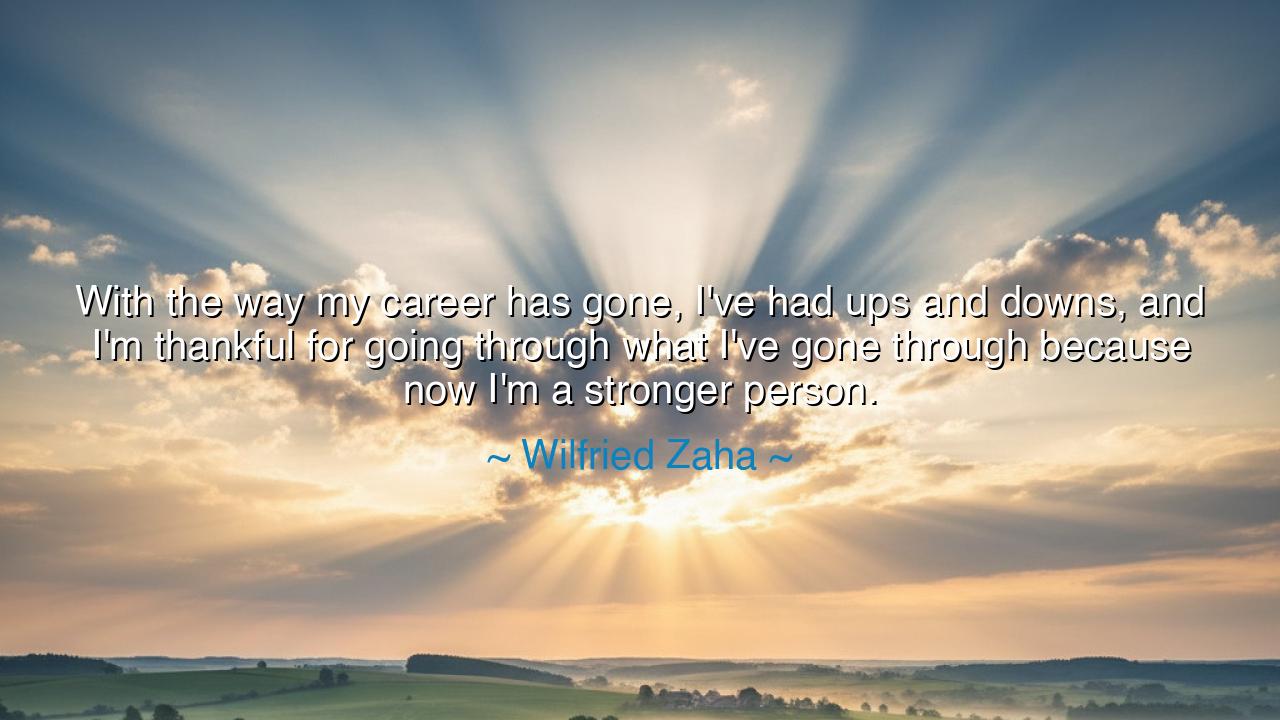
With the way my career has gone, I've had ups and downs, and I'm
With the way my career has gone, I've had ups and downs, and I'm thankful for going through what I've gone through because now I'm a stronger person.






The words of Wilfried Zaha are the words of a man who has walked through fire and emerged tempered: “With the way my career has gone, I’ve had ups and downs, and I’m thankful for going through what I’ve gone through because now I’m a stronger person.” In them lies an ancient truth—that hardship is not a curse, but a forge; not an end, but a teacher. He speaks as one who has felt the weight of expectation, who has known triumph and despair alike, and who has chosen not bitterness, but gratitude. His thankfulness is not for the ease of the path, but for the strength born from its struggles.
To endure ups and downs is the common lot of humanity, yet not all emerge wiser. Many curse their misfortunes and collapse under them. But Zaha reveals the greater way: to see the valleys as preparation for the peaks, to find in every fall the seed of resilience. His career, marked by brilliance at Crystal Palace, the struggles of his time at Manchester United, and the long road back to proving himself, mirrors the journey of countless heroes of history. It is not the absence of failure that defines greatness, but the will to rise again.
Consider the story of Abraham Lincoln, who failed in business, lost elections, and endured profound personal sorrow before becoming one of the most revered leaders of all time. His struggles did not destroy him; they carved him into a man of endurance and vision. Or reflect on the life of Thomas Edison, whose thousands of failed experiments were not wasted, but became the very path to invention. So too, Zaha’s struggles on and off the pitch became the crucible in which his strength was forged. “I’m thankful for going through what I’ve gone through,” he says, because he recognizes that the man he is today could not have been formed without those trials.
This gratitude is not passive—it is heroic. To be thankful for pain is to stand above it, to claim mastery over it, to refuse to let it define you as victim. In choosing gratitude, Zaha transforms defeat into power, wounds into wisdom, and doubt into strength. This is the warrior’s spirit, the ability to look upon scars not with shame but with pride, for they are proof of survival and of growth.
There is also in his words a reminder that strength is not given, but earned. No man is born resilient; he becomes resilient through trial. No soul is born unbreakable; it is in breaking and mending that the soul becomes strong. Zaha’s journey reveals that the most valuable victories are not the ones the crowd sees, but the silent battles within—the battle to keep going when the heart is weary, the battle to keep believing when the world doubts you. These victories shape character far more than any trophy.
The lesson here is clear: do not despise your struggles, for they are the soil in which your strength will grow. Be thankful for the hardships you endure, for they are the hidden architects of resilience. When life strikes you down, rise again—not merely to prove others wrong, but to prove to yourself that you are stronger than yesterday. Every fall you survive becomes the foundation of courage, every storm endured becomes the teacher of wisdom.
Therefore, take this wisdom into your life. When you meet failure, do not curse it, but ask what it is shaping in you. When you face rejection, do not despair, but know it is training you for endurance. And when you succeed, remember that the path to triumph was paved by your stumbles and your scars. Walk forward as Zaha does—thankful for the journey, even its darkest turns—because in the end, the struggle is the very fire that makes the soul strong.






AAdministratorAdministrator
Welcome, honored guests. Please leave a comment, we will respond soon